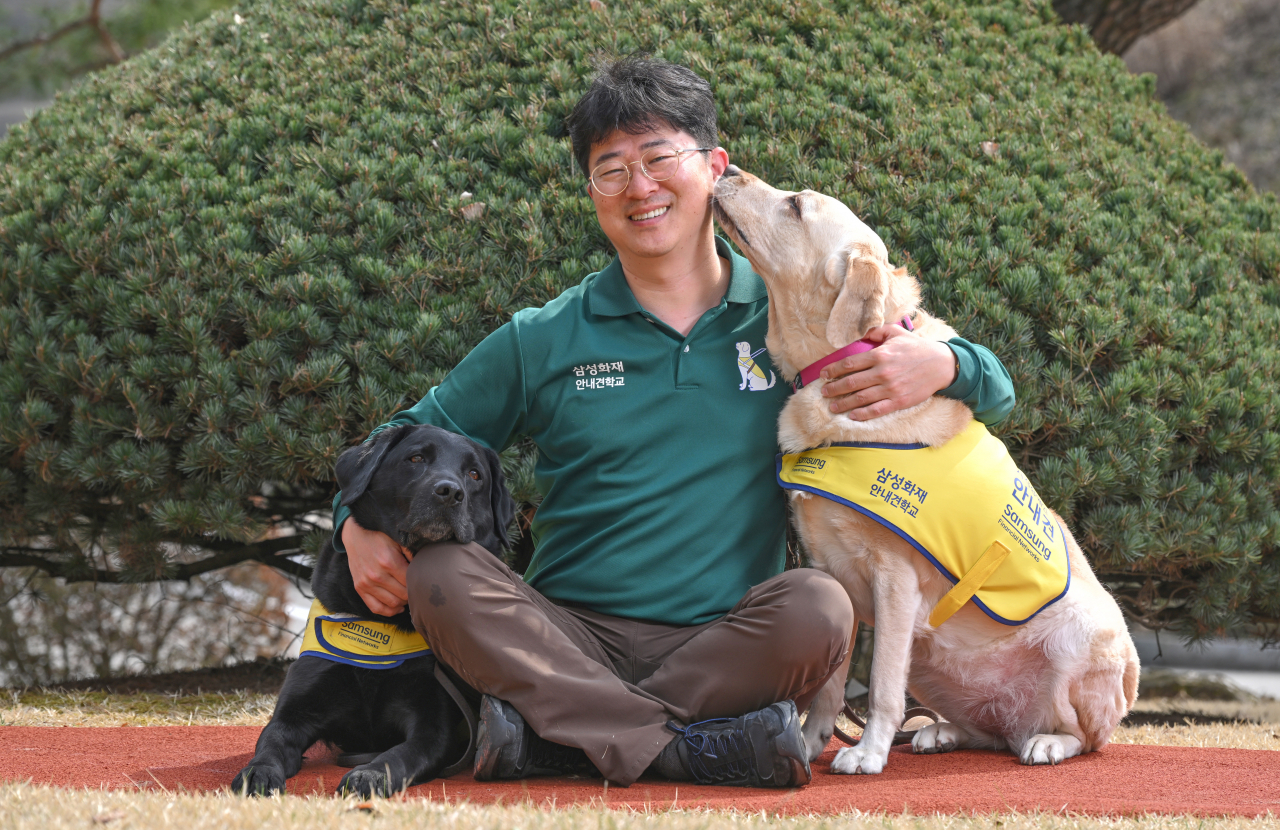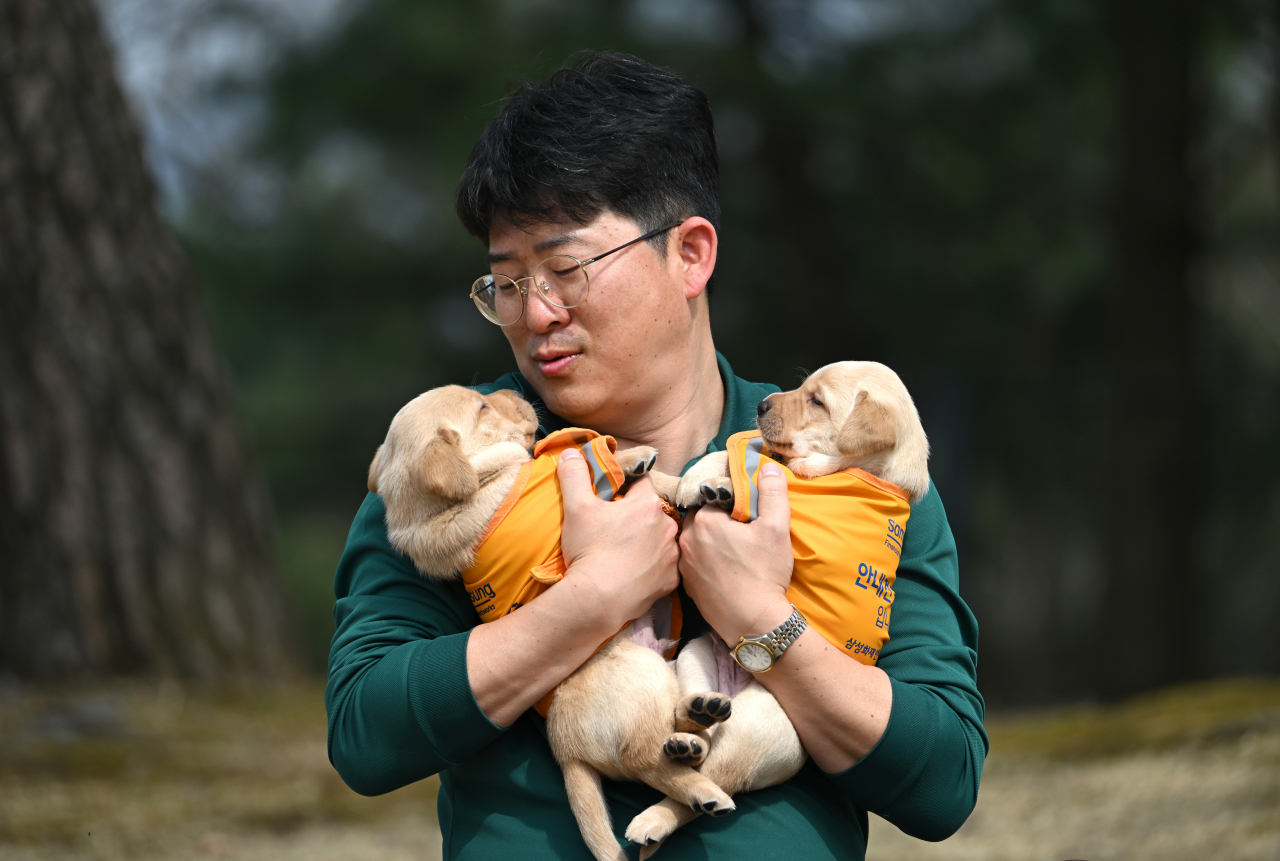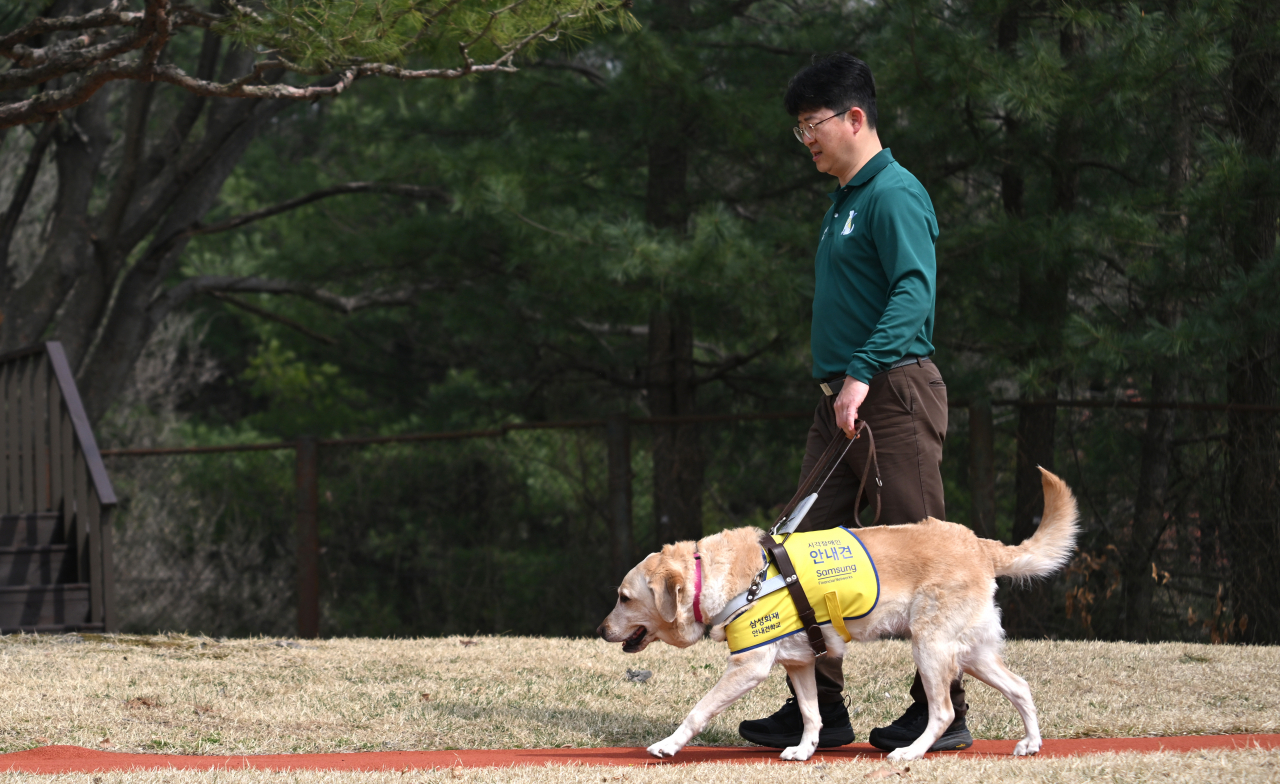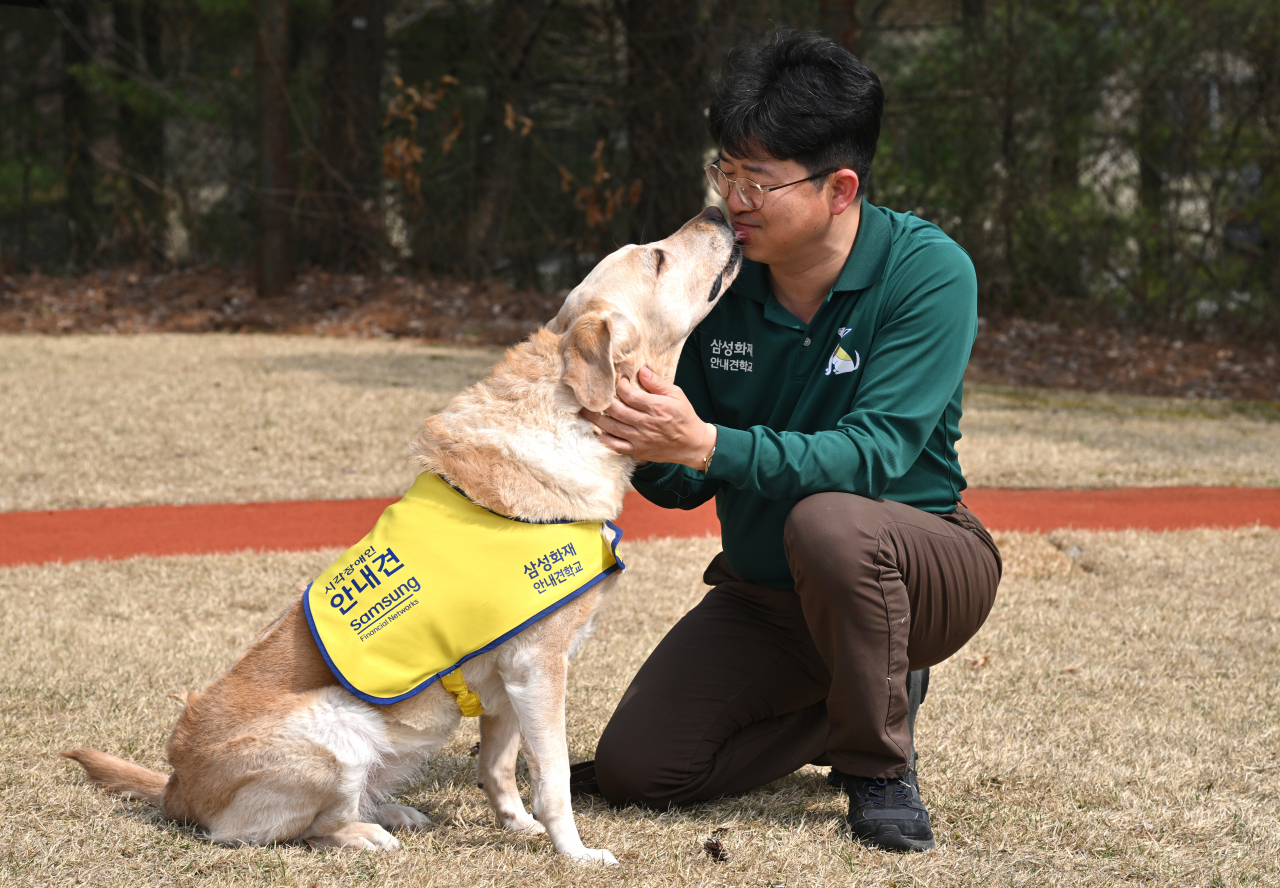[EYE] 'Dogs cherish time with human companions, visually impaired or not'
Despite growing acceptance, guide dog school director counters misperceptions, stresses partnership between human handler and guide dog
By No Kyung-minPublished : April 20, 2024 - 16:00

It was a serendipitous encounter on the subway back in the mid-1990s when young veterinary college student Park Tae-jin first laid eyes on an assistance dog accompanying a passenger he assumed was blind.
"Having never witnessed such a scene before, I felt compelled to follow the person and the dog," said Park, now general director of Samsung Guide Dog.
At that time, there were only around 10 guide dogs in South Korea, he explained.
This seemingly coincidental event helped set his career trajectory, leading him to start working at a guide dog training center as a veterinarian in 2001. A few years later, he switched over to dog training.
Though unable to practice as a vet to the fullest, he discovered profound fulfillment in the field of dog training, believing that his contributions served a greater purpose in society.
Now the director of the school, Park remains resolute in his mission to cultivate a more respectful public understanding of the partnership between humans and their guide dogs.

More than just a dog school
Founded in 1993 by Samsung Fire & Marine Insurance at the behest of late Samsung Chair Lee Kun-hee, Samsung Guide Dog School holds the distinction of being the world's only corporate-run institution for training guide dogs. It is also the sole Korean member organization of the International Guide Dog Federation.
Over a span of three decades, nearly 280 guide dogs have graduated to serve as eyes for people with low vision or vision loss. On average, approximately 15 dogs pass the required tests annually, passing at a rate of 35 percent. Park said the institution aims continuously to expand the number of graduates from the current 15 to 20 this year, and more in the following year.
However, the center does more than train pups to assist people.
Trainers, for instance, get involved in the process of screening candidates for guide dog adoptions, conducting on-site interviews at their homes. They also provide education to both visually impaired individuals and volunteers on proper guide dog care, and carry out regular check-ups with them after the adoption, Park explained.
Volunteers are the backbone of the center, he went on, as they lend support in various capacities, primarily responsible for caring for the school's dogs during the pre-guide dog and post-retirement phases.
The chief led this reporter to a glass-paneled room where a mother dog was nursing her litter of seven puppies.
“All these puppies, aged 4-5 weeks old, have already been reserved to be going to foster homes in about three weeks,” he explained. He noted a long wait list of individuals eager to volunteer as "puppy walkers," with many still awaiting the arrival of new litters this year.
Following completion of the puppy walking program, the socialized dogs return to the school for formal guide dog training. Those not suitable to become guide dogs, and retired ones who have completed their 8-9 years of duty are available for adoption by volunteers who provide lifelong care.
Park said the guide dog school extends its care to the dogs' final moments.
He shared a story about standing beside Parang, the first guide dog he trained, when he was on her deathbed at the school’s hospital, a few years ago. This experience exemplifies the school's commitment, as evidenced by the memorial service held for Parang, attended by his former handler, his family post-retirement and former trainers.
Having bid farewell to numerous guide dogs over the past two decades, Park has come to accept the natural cycle of life and death. He finds peace in knowing that they lived fulfilling lives with an important purpose.

Human handlers, guide dogs
As the topic moved onto people with low vision or vision loss being paired up with guide dogs, Park first wanted to clarify the term correctly.
It’s better to refer to such individuals as “handlers,” rather than “users” or “clients,” which are widely employed terms that imply they merely receive the service of guide dogs, he explained.
He introduced his close associate, Mr. Yoo, a person with complete vision loss, who is paired up with Haedal, a friendly 6-year-old black Labrador retriever.
"I sometimes forget that Mr. Yoo is blind, as he excels in every task that I sometimes cannot do," Park said. "With the help of Haedal, he enjoys life to the fullest, just like anyone else, having married and secured a stable job."
But often, people overlook the efforts that individuals with low vision or vision loss have to put in to function properly as handlers, he pointed out.
He said a well-defined division of labor is needed to synchronize the movements of a human and a dog, likening the human's role to that of a GPS navigation system, and the guide dog's role to that of a driver.
"Blind owners must not only adapt to living with the dog, but also become effective communicators, providing commands and directions to guide the dog to the desired destination," he stated.
For those with vision loss from birth, it is crucial to familiarize themselves with the concept of dogs first, in addition to acquiring the necessary skills for effective cooperation with the guide dogs.
However, not all people with low vision are eligible to adopt canine partners.
"We take into account factors such as their employment status, presence of other disabilities and their ability to give direction commands to the dogs," he said.
“Some individuals may need to wait for 1-2 years to find suitable matches, but ultimately, all of them receive assistance as long as they meet our standards,” he added.
Eligible candidates must commit at least a month in total to becoming proficient handlers. They undergo approximately two weeks of training while staying at the center, followed by an additional two weeks at their own homes for training in familiar settings.
"It also requires considerable time to find the perfect match for applicants, considering their lifestyles and temperaments," he added.
Still, the benefits of having guide dogs are, without doubt, immense.
"Firstly," he explained, "guide dogs foster social inclusion. People tend to be more approachable when a blind individual has a dog by their side."
The constant companionship provides emotional stability and comfort, while caring for a guide dog grants handlers confidence by empowering them to be active caregivers, Park continued.
However, he advised people not to shower guide dogs with inordinate attention, particularly in the streets. Given their natural fondness for humans, guide dogs may become overindulgent and lose focus on their duties.

Misperceptions
In 2020, Lotte Mart was embroiled in controversy when one of its employees refused entry to a dog undergoing guide dog training. This was against the law, which mandates that a dog trainer or person with a disability has the right to enter a public place accompanied by their dog.
This issue, as per Park's observation, significantly heightened public awareness that guide dogs, even during the training or socialization process, have legitimate access to public places.
As Korean society grows more accepting of guide dogs, a certain misperception about these animals has also grown in tandem. Many people view the dogs with sympathy, believing that they work solely for the benefit of their owners, sacrificing their own freedom and happiness.
However, he said guide dogs do not feel like they are sacrificing themselves.
"It is foolish to assume that guide dogs understand the concept of sacrifice, or know what it means to have visual impairment," he remarked. "Spending time with their visually impaired companions is not a matter of 'work' for them, but rather, it's cherished time, much like when people walk their dogs in the park outside."
Guide dogs' level of happiness is not significantly different from that of dogs in other households. In fact, the life expectancy of guide dogs is notably longer on average, at 14 to 15 years, compared to around 12 years for other Labrador retrievers, he explained.
“I feel a great sense of satisfaction whenever I assist these lovely creatures in becoming guide dogs for visually impaired individuals or simply companion dogs for regular households,” he said, further stating that, ultimately, his work centers on facilitating harmonious human-canine relationships.







![[New faces of Assembly] Architect behind ‘audacious initiative’ believes in denuclearized North Korea](http://res.heraldm.com/phpwas/restmb_idxmake.php?idx=644&simg=/content/image/2024/05/01/20240501050627_0.jpg&u=20240502093000)











